It was the early 1970s and I was trying to be a gentleman, a Christ-like guy, a good person. I had quit the football team in junior high because I didn’t like the vulgar, pushy ways of our macho coach who taught us how to hurt opposing players. I had left a social club when I heard they wouldn’t accept blacks, even though I had not met any black people at that point in my life. I knew God loved me, I knew Christ died for me, I knew I was forgiven and that the Holy Spirit somehow would help us live in God’s ways, not our own. I knew enough, through God’s grace, to know that that meant we had to somehow live in a way different from the culture around us.
(By the way, this was years before I came across Os Guinness’s brilliant book The Dust of Death which critiqued both the alienating, technocratic, middle-class culture and the idealistic, lefty counter-culture, but I intuited that somehow my hippy friends were right to reject the mainstream culture, not wanting to “dream the wrong dreams” as Death of a Salesman put it, even though they had few sturdy principles for a better world.)
For me, the culture that I imbibed was a fairly generic sort of civil religion in a mostly white, conservative town. A hippy pal who I listened to records with cajoled me to smoke pot with him, but I refrained. A lovely girl at church camp wanted, um, to go farther than I thought we should. I tried to live for Christ although didn’t know much of what that meant or looked like, as the kids say today. I know I hurt some people along the way which I think about, still.
With the war in Vietnam still raging and me approaching draft age I was struggling with the apparently radical notion of taking seriously Jesus’s words about nonviolence and Paul’s words about “overcoming evil with good” and what it mean to embrace that Kingdom dream of “beating swords into plowshares.” I took Jesus at his word and believed that peacemakers would be blessed. Nobody I knew seemed to think about such things and I felt weird, if a bit self-righteous.
Upon applying for conscientious objector status (with the proud approval of my dad, a WWII vet, and the support of my older brother, a US Army commissioned officer) I became an official, card-carrying C.O. Or, as we were called in those days, a peacenik.
Here’s the point of my story. Over and over, those who disapproved assaulted my patriotism, (which I expected) and, in a move I hadn’t seen coming, they assaulted my manhood. Being unwilling to bomb and burn and kill because I took the Bible seriously was considered being a sissy. I had thought there would be discussions about war in the Bible, about Jesus, about “love, love, love, love, the gospel in a word is love” as we sang around the church camp campfire. Nope. It was: why was I afraid, why was I a sis, why didn’t I grow a pair, why didn’t I be a man? A real man.
The rightness or wrongness of Biblical nonviolence I’ll let go for another day (although, if you are interested, one of my favorite books is If Jesus Is Lord: Loving Our Enemies in an Age of Violence by the late, great, Ron Sider, or the abridged and shorter version, Speak Your Peace: What the Bible Says about Loving Our Enemies.) But this question of the nature of valor and honor and courage and fighting and strength and masculinity continued to be raised. (Quoting Zechariah 4:6 “Not by power, not by might, but by my Spirit saith the Lord,” was a favorite retort, which frankly never moved the needle much on that conversation.)
I hadn’t read any books about it, but I believed strongly that the macho-guy, tough stuff, telling us that “big boys don’t cry”and that true men had to be violent was hogwash. I heard some of the rape jokes used in boot camp training cadences and was repulsed. When a friend later gave me an early book about “men’s liberation” in solidarity with the feminist concerns of the day, it rang true, even if he didn’t cite Jesus as his role model. Even then, I knew that there was something hurtful to men and women when men act poorly, ogling and objectifying women and valorizing and glorifying violence.
Below are five recent books that I very highly recommend — for men and women. The topic is about what has come to be called toxic masculinity. Whether that is a helpful phrase or not, these books offer a critical discussion of what Christians might think and do regarding the allegations that many men are caught in an ideology that seems to justify privilege and power and sometimes even violence.
Given the insights of the #metoo and #churchtoo movements, obviously, these are very, very important matters. As I imply from starting these reviews with the episodes of having my own 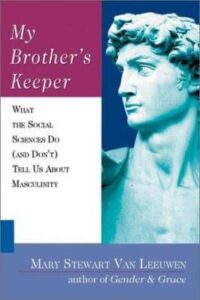 masculinity questioned over filing for conscientious objector status (and trying to be somewhat gentlemanly around the girls I was with) I suggest that these issues have been with me for most of my adult life. Beth and I are still trying to figure it all out.
masculinity questioned over filing for conscientious objector status (and trying to be somewhat gentlemanly around the girls I was with) I suggest that these issues have been with me for most of my adult life. Beth and I are still trying to figure it all out.
(I won’t discuss it now, but the most formative book on this topic for us was the1990 release by Mary Stewart Van Leuween, Gender & Grace: Love, Work & Parenting in a Changing World. She included a line or two about us in her 2002 book, My Brother’s Keeper: What the Social Sciences Do (and Don’t) Tell Us about Masculinity, and both books remain seminal titles in our section on gender roles here in the shop.)
Here are four new ones, with different angles and styles. These books can help, no matter your age or gender.
TO ORDER PLEASE SCROLL TO THE VERY END AND CLICK ON THE ORDER LINKS. ALL BOOKS MENTIONED WILL GET OUR BOOKNOTES 20% OFF DISCOUNT.
 The Toxic War On Masculinity: How Christianity Reconciles the Sexes Nancy Pearcey (Baker) $24.99 OUR SALE PRICE = $19.99
The Toxic War On Masculinity: How Christianity Reconciles the Sexes Nancy Pearcey (Baker) $24.99 OUR SALE PRICE = $19.99
I wish I had time and energy to do an even more detailed study of this extraordinary book. It is quite good, even if sometimes the tone might not appeal to some readers; geesh, endorsements from mostly right-wing types on the back cover will make it unappealing to some. But you should overlook that marketing mishap. She is astute and articulate and analytical; she cites lots of surveys and sociological data, with a big-picture approach to apologetics and cultural criticism. She knows remarkable stuff about history, both the history of ideas and the lived reality on the ground, from the days of the Roman Empire to seemingly last week’s news. I like that a lot and it is a helpful gift from an important writer. You should read her book.
(To be sure, all historical tellings and even the citation of data are always colored and framed by the teller; for instance, she cites Dr. Bradford Wilcox, an important, respected scholar (we’ve long carried his University of Chicago release Soft Patriarchs, New Men: How Christianity Shapes Fathers and Husbands) whose data shows that conservative evangelicals — those who live their faith and are active in church, that is — have less domestic violence and divorce than anyone, anywhere; why don’t we hear that, Pearcey properly asks? Curiously, though, in another book (see below) the same researcher is cited to show somewhat different realities. Perhaps it is different data sets that are being cited by the two authors? Two interpretations of his data? I’m not sure…)
Professor Pearcey covers lots of Biblical texts, starting with a fabulous, brief overview of the narrative plot of the Bible — creation/fall/redemption — and how that offers a grid through which to understand everything. She stands firmly on the shoulders of mentors like Francis and Edith Schaeffer whose clear-headed arguments years ago showed the brilliant young Nancy that Christianity was reasonable, compelling, true, and, yes, therefore, life-enhancing. The warmth with which the Schaeffer’s made their arguments for true truth helped win over many a hurting young adult in the years they ran L’Abri in the Swiss alps and their capacity to host the honest questions of even the most skeptical participant in the 60s counterculture was just what Pearcey needed. If anyone can claim the mantle of Schaeffer today, I think it is Nancy Pearcey.
She tells some of that story briefly, here, pointing in the footnotes to a more full account found in her award-winning magnum opus Total Truth: Liberating Christianity from Its Cultural Captivity. She is unapologetic in using the language of a Christian worldview. [Some of those, you may have heard, who popularized that word decades ago are reluctant to use it, now, since it has, in some circles, been seen as having been co-opted by the alt-right; just think of Marjorie Taylor Green using the “Christian worldview” phrase in her untenable, dominionist way or other dangerous public figures involved with 7M and the like, saying what *the* Christian worldview is.]
Nonetheless, Nancy is fearless, continuing to remind us that a comprehensive, theologically sound Christian perspective on all of life is needed lest we fall for the various ideologies and pressures from the secularized culture. (Think of Romans 12:1-2.) Her previous book, Love Thy Body: Answering Hard Questions about Life and Sexuality, engaged (among other things) the conservative Catholic tradition of natural law and what Pope John Paul II called “the theology of the body” which, of course, put her on a collision course with the LGTBQ community and others who are criticized by, for instance, Carl Trueman, in his powerhouse, if polarizing, work, The Rise and Triumph of the Modern Self: Cultural Amnesia, Expressive Individualism, and the Road to Sexual Revolution. She is not unfamiliar with these sorts of culture warriors and is popular among some on the far right — think Eric Metaxas or Jay Richards at the Heritage Foundation or the podcaster Allie Beth Stuckey — but yet, in this stunning book, she offers a view that, it seems to me, actually transcends ideologies of the left or right. Good for her!
There may be a war on Godly masculinity and in her view, it arises less from the PC, deconstructing left but from more subtle and mainstream forces of sin, given particular dominance in social trends such as industrialization, certain sorts of capitalism, Victorianism, and even revivalism. This is the “secular script” that too often nominal Christians have adopted and which we are called to resist. It’s not men and masculinity that is the problem, but the toxic and secularized worldview that offers a rugged, domineering script for men to follow. And follow it, they do, sometimes with help from their churches. The biggest problem, as she shows in Total Truth, is the “cultural captivity” of the church and the subsequent watering down of the robustly full-orbed gospel. As she often points out, one of the reasons the church has failed to think faithfully about all of life, and therefore has created the possibility for the “cultural captivity” of the church, is because of the heresy of gnosticism. Brilliant!
Pearcey deserves to be read because she is a very thoughtful writer and is accomplished in so many fields, educated in so many topics. Her first book, still in print, is on Christian influences in the history of the philosophy of science and mathematics and is one I still often recommend. She led Chuck Colson’s “Worldview” radio work decades ago and wrote for Breakpoint, even co-authoring a book with Colson on the notion of a Christian approach to all of life, rejecting the dualisms of private faith and public values.
In those years when she was becoming known as a public intellectual and thinker in her own right she drew on scholars such as Herman Dooyeweerd, Lesslie Newbigin, and Michael Polanyi to expose the deep dichotomies that many people live into, that are deeply assumed in their social imaginations. In her studies of science, art, and sexuality, she has shown what Schaeffer taught her about that old split between the upper vs lower story in our thinking, which translates into tensions and dichotomies — personal vs public, faith vs reason, and sacred vs secular, deforming how we think about nearly everything. How can we think of a truthful way of living in the world about anything if faith is necessarily bracketed out to some mysterious “religious” realm or only good for Sunday Christians? She is arguing for a thought-out, practical metaphysics that relates faith to all of life.
What is so very interesting (and makes for a happily enlightening reading experience) about The Toxic War on Masculinity is how she uses social history to tell the story. I know some people would rather just hear preachments on the facts, but she is wise to build a case showing how deformities in our views of things (in this case, about the meaning of gender and the roles of men and women) emerged, often coupled with technological changes and historical shifts. Just think of how industrialization increasingly brought men into factories and away from their families and the subsequent rise of the Victorian era’s views of domesticity. (By the way, the forthcoming Karen Swallow Prior book that we highlighted in the previous BookNotes offering a history of the rise of evangelicals in the 1700s, 1800s, and 1900s, tracks nicely with Ms. Pearcey’s work and I’m glad I read the two books back to back. You should pre-order that now if you haven’t.)
Pearcey is applying her keen eye for a curious sociological fact and a wild historical detail — even showing etchings or paintings and old fashioned book covers — to illustrate huge changes in the way people thought and thereby lived. Or lived and so thought. (Ahh, the old chicken and the egg question, eh?) She is adamant that the tough-guy, macho-man stuff is not what it means to be a good or Biblically faithful man, even though it is what many think to be a “real” man. She plays on that contrast — the real man vs the good man. Knowing how we got in this mess of what constitutes a “real” man is vital. Given the abuse and sorrow caused by toxic men, it is urgent and a matter of deep lament.
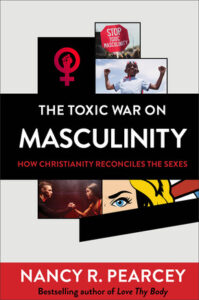 And here’s her plea: we ought not confuse what a “real” man is with what a “good” man is. (Her early explanation of the large, cross-cultural study on this exact matter by Michael Kimmel is quite clarifying.) We need to know how masculinity got so toxic, and insist — in our homes, our churches, and in the public square, she would say — that the toxic version is not the real deal. It is a counterfeit sort of distortion, played out when men and women adopt the secularized script from our post-Christian culture. She is about centering the life-changing power of the gospel and offering a Christian worldview that would make sense of our genders and our sexuality, without adopting goofy gender roles that come more from the culture (from John Wayne, we might say) than from the Bible.
And here’s her plea: we ought not confuse what a “real” man is with what a “good” man is. (Her early explanation of the large, cross-cultural study on this exact matter by Michael Kimmel is quite clarifying.) We need to know how masculinity got so toxic, and insist — in our homes, our churches, and in the public square, she would say — that the toxic version is not the real deal. It is a counterfeit sort of distortion, played out when men and women adopt the secularized script from our post-Christian culture. She is about centering the life-changing power of the gospel and offering a Christian worldview that would make sense of our genders and our sexuality, without adopting goofy gender roles that come more from the culture (from John Wayne, we might say) than from the Bible.
I’ve spoken out about these things often — remember my opening story — so I suppose I should not be surprised that she quotes me a time or two in the book, from an old BookNotes piece where I railed creatively against the super-macho, unbiblical weirdness of the book Wild at Heart. Nancy, you see, wants to reform our churches and public attitudes by recovering a proper view of healthy masculinity but not like that, what with all the foibles of Eldridge’s bad theology and dumb stereotypes. In fact, she has a section pondering the lasting wisdom of churches holding stereotypical men’s events to somehow attract and sustain their men’s ministry (like a church that holds “Fight Clubs” and another that raffles off AK-15s and yet another that had “Cage Fighting” in the sanctuary.) Her exploration of the rise of “muscular Christianity” is great, from the rise of the YMCAs in the 1840s through the “hard-muscled, pick-axed religion” of baseball star turned evangelist, Billy Sunday (as opposed to what Sunday called a “dainty, sissified lily-livered piety.”) The “ultimate symbol of female debauchery” for the fundamentalists of the 1920s became the flappers, she points out, as women became a scapegoat for many social ills. Moody Bible institute, who initially called women to brave and heroic service in the mission field (and elsewhere) by the middle of the 20th century were mostly offering cooking and homemaking classes for the ladies and calling on Godly men to “suppress your wife’s ambition.” Nancy may be a theologically and socially conservative in many ways, but she exposes this claptrap for what it is.
Importantly, by the middle of and later into the 20th century, evangelicals had differentiated themselves from fundamentalists and rejected the “muscular Christianity” ideal. But, still, she observes, “most evangelical churches are puzzled over how to minister effectively to men. The typical US congregation remains unbalanced, with roughly 60 percent female and 40 percent male. The conundrum of how churches can attract men has not been resolved.”
As I read the book twice (once in an earlier manuscript draft galley and once again when the nice hardback arrived) I was somewhat wary. I disagree with some of her views in her previous books and wish she would offer a better nod to the complexity of Biblical interpretation around hot topics such as LGTBQ inclusion and gender justice. Although it is not her fault, some that have endorsed her books are nearly tone deaf about matters such as racism and the harm inflicted by conventional churches on sexual minorities and are bone-headed in their narrow perspectives. But to this wary reader every chapter got better and better and by the middle of the second section — “How the Secular Script Turned Toxic” — I was nodding and underlining. The important third part is under the rubric of a few chapters called “When Christian Men Absorb the Secular Script” and the writing and insights are no-nonsense and compelling, even as she always is careful not to turn off those who are touchy about this topic.
It is her hope, she wrote to me a while back, that fairly traditionalist men who are themselves frustrated about being called toxic and take personally the attack on their traditionalist views from what they consider to be elites, will not dismiss her as another raging feminist who doesn’t honor their dignity or care about their concerns. She is aware of the hostility aimed at men and what she might call “media stereotypes.” I appreciate that she is trying to speak to different audiences and hope that the book will be taken up by various folks across the church spectrum and throughout the cultural divides.
She says in the beginning that she was a bit surprised how controversial her writing about this seemed as she was working on the book. Everybody wondered what she was going to say, whose ox was going to get gored, what side she was on. Culture wars have caused suspicion and polarization; many conservatives hate feminists and most progressives despise traditionalists. In the aftermath of #metoo and church cover-ups and evangelical weirdness like the awful Mars Hill nonsense with Mark Driscoll, etc. this book is needed. While it is poised for a wide readership, it may be misunderstood. Despite her careful writing and her tons of amazing footnotes, I fear some will not give it a fair chance. (The choppy modernist cover doesn’t help any, but that’s another matter.) Whether you tend to tilt left or tilt right in your social and political leanings, I hope you give this thought-provoking volume a chance.
Let me be blunt: I think those on the more progressive and liberal side of the church pews will distrust her traditionalist views and her caution not to scare off ordinary conservative men (including young men, who, she reports, feel attacked in recent years) may not sit well with them. Yet, she is right to be impeccably fair and not overstate things or scapegoat men (let alone blue collar men.) Frankly, some who are pretty traditionalist and who will appreciate Pearcey’s conservative bona fides, are going to be challenged to learn how the evangelical church has adopted too much of the “secular script” and how our deeply ingrained dualisms have framed our approach even to the nature of masculinity and femininity.
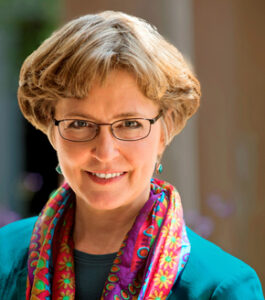 I suspect that Nancy attends a church that does not ordain women (I really don’t know) but she is an unashamed advocate for equal rights for women in the public square. She has herself worked in philosophy, public media, the sciences, and is not inclined to take up the typically Southern, evangelical niceties of ladies teas and craft-making retreats. She is a strong, left-brained Christian leader and needs to be heard; she taught the ex-Marine Chuck Colson much of what he knew about a Christian worldview, after all. Her balance and logical approach should appeal to many. Those who want a more progressive sort of manifesto against straight white males without the deeper thinking about it all, really ought to read it, too. Agree fully or not, it is one of the more interesting books on this topic I have seen in quite a while.
I suspect that Nancy attends a church that does not ordain women (I really don’t know) but she is an unashamed advocate for equal rights for women in the public square. She has herself worked in philosophy, public media, the sciences, and is not inclined to take up the typically Southern, evangelical niceties of ladies teas and craft-making retreats. She is a strong, left-brained Christian leader and needs to be heard; she taught the ex-Marine Chuck Colson much of what he knew about a Christian worldview, after all. Her balance and logical approach should appeal to many. Those who want a more progressive sort of manifesto against straight white males without the deeper thinking about it all, really ought to read it, too. Agree fully or not, it is one of the more interesting books on this topic I have seen in quite a while.
I was going to lead with this detail and then considered omitting it. But here’s a fact we learn: she tells it in the first page of her introduction, so it is not much of a spoiler. Nancy was physically abused as a girl, viciously so, by a church-going father. His domestic violence left a life-long mark, to be sure, but one key insight that she learned early on was that she “had two fathers. A Public one and a Private one.”
This book is very important to her. I applaud her bravery in saying it all.
Can we agree that masculinity is a God-given thing, not merely a social construct? Can we at least agree that the sort of masculinity that is now too often on show is defaced, even toxic, as a distortion of some God-given characteristics? Can we appreciate the nuance of her title, the “toxic war on masculinity”? Some will think she means the leftist and feminist attack on traditional values, and I suppose that is hinted at; she is no friend of postmodern deconstruction or the cheaply woke. But more, she is insisting that sin is always like a parasite, distorting that which it claims, and the goal of our sanctification and spiritual formation is to be healed from the distortion of sin’s influence and to embody a Christ-like restoration of original goodness. We need not askew all distinctions between genders, but, in Christ, we can restore the virtues of men and women in healthy, Biblically-warranted and life-giving ways. The toxic script keeps us from doing that. It demeans guys, fathers, and makes it harder to be a good husband. The Toxic War on Masculinity explains in great detail how all of that happened, and offers hope for renewed practices. It all leads to the insights of a deeply moving epilogue, “A Tribute to Manhood.” You’ll have to read it yourself, working through the many pages and pondering the great discussion/reflection questions that are in the back. There’s a lot here.
As always, I am in awe of Nancy Pearcey’s research–from Harriet Beecher Stowe to how Romans really treated women 2,000 years ago. And so much history of American manhood from the eighteenth and nineteenth centuries that I never knew. It’s sobering to hear how old the battle of the sexes really is. — Julia Duin, Newsweek contributing editor/religion
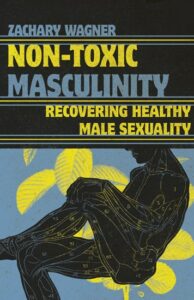 Non-Toxic Masculinity: Recovering Healthy Male Sexuality Zachary Wagner (IVP) $18.00 OUR SALE PRICE = $14.40
Non-Toxic Masculinity: Recovering Healthy Male Sexuality Zachary Wagner (IVP) $18.00 OUR SALE PRICE = $14.40
I am sure you have heard of some of the recent critiques of what has come to be known as “purity culture.” Such a culture was everywhere in evangelical circles in the 1980s and 1990s and, now, years later, so pervasive was this harsh ethos about staying sexually pure, that many have left the Christian faith over it. The phrase Purity Culture has come to stand for a lot, from the million-selling book by then youngster, Josh Harris, I Kissed Dating Goodbye to the right-wing, anti-LGTBQ politics of Focus on the Family. This stuff wasn’t harmless then, and we are now seeing the bad fruits from those eccentric, overstated fears of sex and the world, and the authoritarianism (for men) embedded is much of that subculture.
Zachary Wagner grew up in that world and he is honest about how it harmed his view of his masculinity, his sexual desires, and his view of the relationship of Christianity to the world. He assures us that important books by women on purity culture must be read (he recommends several that we have reviewed, from across the ideological spectrum, which is good and brave and rare, actually, affirming books that he doesn’t fully agree with.) However, as much as many of us have read historian Kristen Du Mez’s take down of all of this in her must-read Jesus and John Wayne and as clear-headed and important as Rachel Joy Weltner’s Talking Back to Purity Culture is, we have not yet seen a book like this. On almost every page or so, I stopped to marvel at his great care for others, his own vulnerability as an author, and for the wisdom of his evangelical publisher for doing such a book within that subculture’s expectations.
In a way, this is a good follow-up to Pearcey’s aforementioned The Toxic War on Masculinity. I wonder how to explain the power and distinctions of Wagner’s Non-Toxic Masculinity. I do not mean to pitch this as a more progressive, open-minded view versus her more conventional, if surprisingly feminist-friendly, take. That isn’t quite it. I pondered if there are generational differences between the two authors — the writing style is more casual, here, the personal anecdotes more central (and heartbreakingly tender.) It has a lot of footnotes, too, but isn’t as historical or quite as sociological as Pearcey’s. Yet, it is honest and thoughtful and I really, really liked it a lot.
Wagner is asking how we might rethink masculinity, given how toxic it sometimes is. He doesn’t do the deep dive into the sociological history of how gender roles and assumptions about our respective virtues developed but he is keenly aware of how church culture — especially the purity culture promoted within evangelicalism in recent decades — has harmed many. And, man, this is tough stuff. He is really honest, shares lots of stories, and is thoughtfully engaged in the cutting edge conversations about sexual integrity in a post-purity culture world.
Three things make this an exceptional work, a valuable resource for anyone wanting to explore human sexuality.
First, Wagner, while a fairly conventional and theologically astute evangelical, goes out of his way to consider the different views and experiences of his readers. He names LGTBQ+ friends and invites those who don’t fit the typical cisgender descriptions to bear with him. He is an ordained minister and has worked for the very thoughtful Center for Pastoral Theologians (led by the excellent Todd Wilson) and is now pursuing a PhD in New Testament studies at the University of Oxford. But he wears his learnedness lightly and has offered us a kind and gracious sort of book. Come to think of it, it is rare in my experience to have a few asides and comments and footnotes inviting readers who are different to read along with him. I liked that.
Secondly, while it is about toxic and unhelpful way the Purity Culture stuff influenced his strict fundamentalist sort of faith (and he reports horrific stories of others) is not only a critique of the dumb and patriarchal views of Josh Harris and Mark Driscoll, et al. Rather, he is digging more deeply into normative sexuality, wondering how male sexuality, itself, can be refined and reformed and renewed. To do this, he reads widely (again, citing some sex-positive authors that he admits to appreciating, while disagreeing with some of their work, such as his comments about a particularly provocative section of Shameless by Nadia Bolz-Weber.)
 In this part of the book he is exceptionally honest about his own struggles with a sense of privilege and rights about sex, even as he came to grapple with that when his wife was herself struggling with hardships that kept her from enjoying sexual intimacies. I had tears in my eyes through some of these pages — I’ve never read anything like this so candid and complicated and finally gracious about one’s marital intimacies and struggles. His writing about sexuality is not singular — there really are others who explore in egalitarian ways about mutually-pleasing sex, but few evangelical writers have done so. Wagner himself cites Jonathan Grant’s heavy 2015 Brazos Press book Divine Sex: A Compelling Vision for Christian Relationships in a Hyper-sexualized Age and he says very good things about The Great Sex Rescue: The Lies You’ve Been Taught and How to Recover What God Intended and other books by Sheila Wray Gregoire.
In this part of the book he is exceptionally honest about his own struggles with a sense of privilege and rights about sex, even as he came to grapple with that when his wife was herself struggling with hardships that kept her from enjoying sexual intimacies. I had tears in my eyes through some of these pages — I’ve never read anything like this so candid and complicated and finally gracious about one’s marital intimacies and struggles. His writing about sexuality is not singular — there really are others who explore in egalitarian ways about mutually-pleasing sex, but few evangelical writers have done so. Wagner himself cites Jonathan Grant’s heavy 2015 Brazos Press book Divine Sex: A Compelling Vision for Christian Relationships in a Hyper-sexualized Age and he says very good things about The Great Sex Rescue: The Lies You’ve Been Taught and How to Recover What God Intended and other books by Sheila Wray Gregoire.
Thirdly, I really appreciate the emphasis, especially in the last half, about how the role of sex itself is not to be overstated. That is, whether we are sex positive progressives or deeply fearful fundamentalists, we can make an idol out of this part of our lives — sex, marriage, and family life, too — and this isn’t Biblically faithful and isn’t helpful for those who struggle, those who cannot have children, those who are intersex, and certainly those who are single. Our siblings in Christ who are not in conventional married arrangements deserve to be included in these conversations as well and his brief story about Christian living arrangements that move towards intentional community, are healthy and wise. (I notice that he thanks his friend Wesley Hill in the acknowledgments page and it is good that he cites Hill’s spectacular book on friendship, Spiritual Friendship: Finding Love in the Church as a Celibate Gay Christian.) This is all so tender and real and honest.
From chapters as punchy as “Wake Up, Guys” to “Act Like An Adult” to wise and touching ones like “The Worst Sex You’ve Ever Had” to insightful pieces like “Victims of Our Own Desire?” and the amazingly brilliant chapter on fatherhood, Wagner offers good, good stuff. He’s upbeat enough to keep it lively, and he’s honest enough to come across as humble and nowhere near a macho know-it-all. (That he used to be a Mark Driscoll fanboy is hard to believe given how gracious he now is.) He’s rooted in the Scriptures and confronts harmful teaching (even from the American evangelical church) that distorts desire and sex and relationships. It is very good, the back cover says, for those who “feel disillusioned and adrift.” Who doesn’t want to resist dehumanization? Read the book. Join the movement. We can offer a better approach. Kudos!
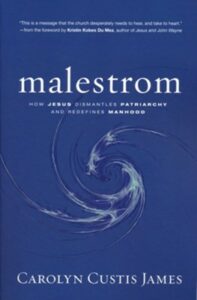 Malestrom: How Jesus Dismantles Patriarchy and Redefines Manhood Carolyn Custis James (Zondervan) $19.99 OUR SALE PRICE = $15.99
Malestrom: How Jesus Dismantles Patriarchy and Redefines Manhood Carolyn Custis James (Zondervan) $19.99 OUR SALE PRICE = $15.99
We thought this was an excellent book when it first came out, nearly a decade ago, a wonderful follow up to James’s good work on women in the Scriptures (Lost Women of the Bible) and on women in the global church (Half the Church: Recapturing God’s Global Vision for Women.) She’s done a good book on Ruth (The Gospel of Ruth: Loving God Enough to Break the Rules) and a smaller Bible study of Ruth as well. Not long ago she wrote a moving forward to a book by a young woman who we touted at BookNotes, Women Rising: Learning to Listen, Reclaiming Our Voice by the young-ish Meghan Tschanz. Carolyn Custis James is a strong and healthy leader and an adjunct professor at Missio Seminary in Philadelphia. We are fans.
What is interesting about this excellent book is that Zondervan saw the importance of reminding book buyers of this kind of resource and re-released it into the marketplace in the hard year after #metoo and #churchtoo. I’m not sure that’s the only reason, but they gave it a sharp, new cover, and showed off a nice blurb from a brand new foreword by historian Kristin Kobes Du Mez on the front. It says, simply, “This is a message that the church desperately needs to hear, and to take to heart.”
Some of you will appreciate the endorsing recommendation by Aussie Michael Bird (co-author with N.T. Wright) and podcast host with Aimee Byrd (Recovering from Biblical Manhood and Womanhood) who says:
The book that every Christian man needs to read. It is a powerful mix of personal story, biblical commentary, and cultural analysis that is hard to put down. — Michael Bird, author of God’s Israel and the Israel of God: Paul and Supersessionism
God’s intention for the appropriate flourishing of human life has been severely thwarted by culturally captive expressions of masculinity that have oppressed both women and men. Malestrom offers us a reminder from Scripture that God’s intention for men was not for a dysfunctional masculinity that devastates the image of God within us. Thank you, Carolyn Custis James, for your historical and theological insights that will reshape how I live out my faith in the world. Thank you for a book that benefits both my son and my daughter. — Dr. Soong-Chan Rah, Professor of Church Growth and Evangelism; author of Many Colors: Cultural Intelligence for a Changing Church
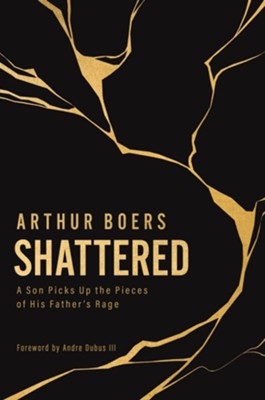 Shattered: A Son Picks Up the Pieces of His Father’s Rage Arthur Boers (Eerdmans) $22.99 OUR SALE PRICE = $18.39
Shattered: A Son Picks Up the Pieces of His Father’s Rage Arthur Boers (Eerdmans) $22.99 OUR SALE PRICE = $18.39
I highlighted this earlier in the summer when I did a BookNotes blog about memoirs. I named a few new ones, important ones, even, and this was among them. I had skimmed it a bit and knew enough to assure readers that it would be a moving read, a look into a complicated life, sharing the memories of a Christian pastor and writer I admired. I noted that his parents were Dutch immigrants to Canada and he was raised in a very strict congregation of the CRC. His father built greenhouses and Arthur learned the work of working with glass as a youth. He has scars to prove it, as the slices from broken glass were an occupational hazard. The title Shattered resonates on many levels in this exceptional book.
I have now finished the book and cannot begin to tell you in a short space how grateful I was to have read it, how enjoyable it was, in a manner of speaking. That is, the way any book of good writing and good storytelling, of tension and agony and goodness and grace, can be enjoyable, even if it at times hard. And it was hard. Did I mention the bleeding slices, the broken glass, the horror?
Arthur — whose parents spoke Dutch as their native tongue and couldn’t pronounce the name they have him, calling him Artur —is, as I’m sure I said last month, a writer and thinker I admire greatly. Raised in a severely strict and insular, immigrant Reformed church that proclaimed the tight dogmas of election and God’s sovereignty and predestination and the like, he always had a deep hunger for the things of God, for spirituality that wasn’t spoken of much amidst the dogma and duties.
His father was a bit cynical about religion (and swore and drank and smoked several packs a day) and as Artur grew up in the 60s and 70s he came to a deeper faith causing him to leave the CRC. Boers became Mennonite, which is, actually, only a small part of the story, yet important, as he learned an evangelical sort of faith that was proclaimed with great grace, reminding the followers of Jesus to be, well, just that: Christ-like followers of the rabbi King. Who knew? His home church was surely shaped in some ways by the fact that many were survivors of the brutal Nazi takeover of their homeland in The Netherlands; his own violent father was surely a PTSD victim from his years in the war against the Nazis and then his further soldiering in Holland’s colonial war in Indonesia that left tens upon tens of thousands of civilians killed. This surely left a mark and this book, in a way, is a life-long processing of it all, being raised by a man who lived with what today we might call injured but still toxic masculinity. Through plain, rich, prose, and really interesting storytelling, the author raises poignant questions of home and safety, of joy and sorrow, of immigration and difference and accommodation, of family love and abuse, of church and spirituality, of calling and obligation, of being a man and of being a Christian.
There is, admittedly in the previous two books I’ve mentioned in this post — Pearcey’s The Toxic War Against Masculinity and Wagner’s Non-Toxic Masculinity — conversations about fathering. (More in the first, where, like Arthur Boers, Nancy Pearcey’s father was violent towards her.) Father hunger is a phrase some use when a father is absent and young women and men feel the loss.
 Arthur Boers to this day lives with a sense of remorse, surely regretting that his father would never voice regret. There is father hunger, although his memories are not all bleak. There are tender moments in the book — father and son listening to Dixieland and Louis “Satchmo” Armstrong together and Art (dangerously, I’d say) taking his dad to a Stevie Ray Vaughn concert of rowdy Texas blues. His dad was a hard worker in the family business and it is captivating to hear how Arthur came to tell his mother and father that he was interested in going into the ministry, rather than becoming the “and Son” on the lettering on Papa’s work truck.
Arthur Boers to this day lives with a sense of remorse, surely regretting that his father would never voice regret. There is father hunger, although his memories are not all bleak. There are tender moments in the book — father and son listening to Dixieland and Louis “Satchmo” Armstrong together and Art (dangerously, I’d say) taking his dad to a Stevie Ray Vaughn concert of rowdy Texas blues. His dad was a hard worker in the family business and it is captivating to hear how Arthur came to tell his mother and father that he was interested in going into the ministry, rather than becoming the “and Son” on the lettering on Papa’s work truck.
Shattered works on several levels and would certainly be enjoyable to anyone who grew up in the late 1950s and early 60s, who experienced some of the faith exploding in the 1970s. I loved his casual descriptions of TV shows and songs. (It was nearly a throw-away line but the conflict even over the 1971 pop hit, “Put Your Hand in the Hand” with some in church disapproving of religion in rock, sounded very familiar!)
Arthur is a different kind of parent than the sort that abused him. (And, truth be told, Arthur’s father, his Poppa, was less violent with Arthur than Opa was with Pop back in Holland.) More importantly, he is expressive about his faith, his doubts, his longings, and his hopes. He is a vivid nature writer — the most exquisite writing is in a chapter telling about the creatures found in a rural cottage he uses for solace and retreat. He is a good storyteller — the story of the end of a dramatic few days with Henri Nouwen was cathartic in the most wonderful way.
But yet, lovely as some of this is, it is finally a story about male violence, about father hunger, about the sadness of a boy growing up wondering if he is fully loved and accepted. This goes to the deepest matters behind much of the toxic masculinity we hear about, and, as an artful literary memoir, Shattered: A Son Picks Up the Pieces of His Father’s Rage is a perfect story to compliment the three books above. Highly recommended.
This brave and wonderful book made me feel gratitude, care, and something like quiet awe. And it made me think–about generational inheritance, about the ways violence lingers, about forgiveness, and, most abidingly, about my own dead mother. I think of her, and of myself unto her, differently now that I’ve read Shattered. –Lauren F. Winner, God Meets Girl and Still
Arthur Boers’s Shattered takes us into the fascinating world of the Dutch immigrant experience. In exquisite detail, we’re given a rich sense of history–cultural, theological, and family–that stands on its own. But more than this, Arthur reckons with a lineage of male anger and abuse. His narrative reflections gesture the way forward for all of us who carry the weight of familial rage. — Leslie Leyland Fields, Forgiving Our Fathers and Mothers: Finding Freedom from Hurt and Hate
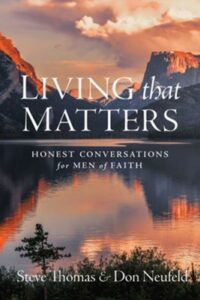 Living That Matters: Honest Conversations for Men of Faith Steve Thomas & Don Neufeld (Herald Press) $18.99 OUR SALE PRICE = $15.19
Living That Matters: Honest Conversations for Men of Faith Steve Thomas & Don Neufeld (Herald Press) $18.99 OUR SALE PRICE = $15.19
I wrote about this a few weeks back, so I need not belabor it again, other than to say it is a great, thorough handbook for cultivating wholesome, Christ-like, masculinity, done by two Mennonite leaders who serve their denomination’s men’s formation ministry. I wonder if Arthur Boers knows either of these two? Maybe so.
This is arranged almost like a devotional but it is more of a manual, a guidebook, a curriculum for many, many great conversations to be had with others. It is what one author called “a beacon of light to guide men through the stormy seas of toxic masculinity toward a more Jesus-centered ideal of what it means to be a man.” If you are a man who doesn’t have somebody to work through this stuff with, read it on your own. Some of it will be life-changing, I’m sure.
There are 10 readings with discussion questions on various topics under each of the seven major sections. These sections are named, Male Formation, Human Needs, Personal Challenges, Sexual Wholeness, Social Practices, Conflict Tools, Life Role. The book has several appendices and good resources for how to invite men into living lives consistent with the will and purpose of God in the world. Talk about shalom? This is it! What a profound, interesting, upbeat, but honest resource for anyone doing serious men’s ministry. Or for anybody wanting a tool for their own growth and reflection. Hooray.
The authors, I just discovered, edited a few years ago a collection of essays called Peaceful at Heart: Anabaptist Reflections on Healthy Masculinity (Resource Publications; $33.00.) It’s a bit pricey, but with 260 pages I think it sounds so important we’re going to pick it up to stock here.
Here is what the publisher says about Peaceful at Heart and it seems to capture the lovely and useful nature of their new Living That Matters, as well:
While there are plenty of books by men, for men, on the topic of “Christian masculinity,” these books generally fail to address men’s propensities for violence and the traditional inequity between men and women, often endorsing inequity and sanctioning aggressive behavior as an appropriate “manly” response to conflict. Peaceful at Heart cuts through this conversation by offering a uniquely Anabaptist Christian perspective on masculinity. The vision of masculinity presented in this book is more peaceful, just, caring, life-giving for men, and more sensitive to women and children than both traditional images of masculinity and the hypermasculine images promoted by contemporary popular culture and wider evangelical Christianity. Peaceful at Heart addresses men and masculinity using Anabaptist theological themes of discipleship, community, and peace. As a collaborative project by men, for men, this book demonstrates through personal narratives, theological reflection, and practical guidance the importance of collective discernment, accountability, and mutual encouragement regarding how to live as peaceful men in a violent world.
+++
TO PLACE AN ORDER
PLEASE READ, THEN SCROLL DOWN AND CLICK ON THE “ORDER HERE” LINK BELOW.
It is very helpful if you tell us how you prefer us to ship your orders.
The weight and destination of your package varies but you can use this as a quick, general guide:
There are generally two kinds of US Mail options, and, of course, UPS. If necessary, we can do overnight and other expedited methods, too. Just ask.
- United States Postal Service has the option called “Media Mail” which is cheapest but can be slow. For one typical book, usually, it’s about $3.85; 2 lbs would be $4.55.
- United States Postal Service has another option called “Priority Mail” which is $8.50, if it fits in a flat rate envelope. Many children’s books and some Bibles are oversized so that might take the next size up which is $9.20. “Priority Mail” gets much more attention than does “Media Mail” and is often just a few days to anywhere in the US.
- UPS Ground is reliable but varies by weight and distance and may take longer than USPS. We’re happy to figure out your options for you once we know what you want.
If you just want to say “cheapest” that is fine. If you are eager and don’t want the slowest method, do say so. It really helps us serve you well so let us know. Just saying “US Mail” isn’t helpful because there are those two methods, one cheaper but slower, one more costly but quicker. Which do you prefer?
BookNotes
SPECIAL
DISCOUNT
20% OFF
ALL BOOKS MENTIONED
+++
order here
this takes you to the secure Hearts & Minds order form page
just tell us what you want to order
inquire here
if you have questions or need more information
just ask us what you want to know
Hearts & Minds 234 East Main Street Dallastown PA 17313
read@heartsandmindsbooks.com
717-246-3333
Sadly, as of July 2023 we are still closed for in-store browsing. COVID is not fully over. Since few are reporting their illnesses anymore, it is tricky to know the reality but the best measurement is to check the waste water tables to see the amount of virus in the eco-system. It is bad; worse than it was two years ago, even. It’s important to be aware of how risks we take might effect the public good as those at risk, while not dying from the virus, are experiencing long-term health consequences. (Just check the latest reports of the rise of heart attacks and diabetes among younger adults, caused by Covid.) It is complicated, but we are still closed for in-store browsing due to our commitment to public health (and the safety of our family, staff, and customers.) The vaccination rate here in York County is sadly lower than average. Our store is a bit cramped without top-notch ventilation, so we are trying to be wise.
We will keep you posted about our future plans… we are eager, but delayed, for now.
We are doing our famous curb-side and back yard customer service and can show any number of items to you if you call us from our back parking lot. It’s sort of fun, actually. We are eager to serve and grateful for your patience as we all work to mitigate the pandemic. We are very happy to help, so if you are in the area, do stop by. We love to see old friends and new customers.
Of course, we’re happy to ship books anywhere.
We are here 10:00 – 6:00 EST / Monday – Saturday. Closed on Sunday.

